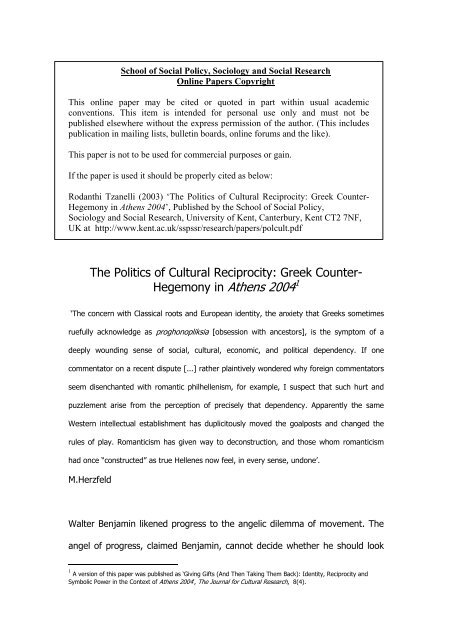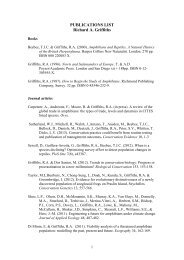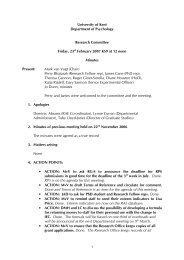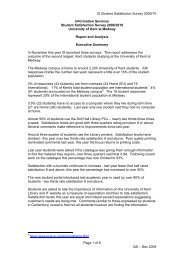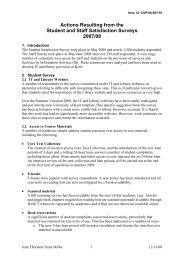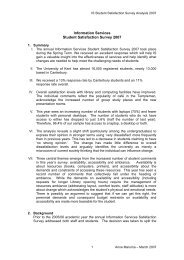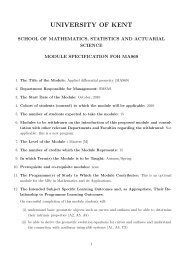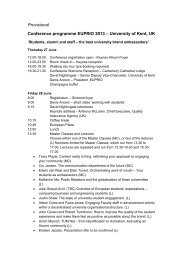cspdf, Job 181 - University of Kent
cspdf, Job 181 - University of Kent
cspdf, Job 181 - University of Kent
Create successful ePaper yourself
Turn your PDF publications into a flip-book with our unique Google optimized e-Paper software.
School <strong>of</strong> Social Policy, Sociology and Social Research<br />
Online Papers Copyright<br />
This online paper may be cited or quoted in part within usual academic<br />
conventions. This item is intended for personal use only and must not be<br />
published elsewhere without the express permission <strong>of</strong> the author. (This includes<br />
publication in mailing lists, bulletin boards, online forums and the like).<br />
This paper is not to be used for commercial purposes or gain.<br />
If the paper is used it should be properly cited as below:<br />
Rodanthi Tzanelli (2003) ‘The Politics <strong>of</strong> Cultural Reciprocity: Greek Counter-<br />
Hegemony in Athens 2004’, Published by the School <strong>of</strong> Social Policy,<br />
Sociology and Social Research, <strong>University</strong> <strong>of</strong> <strong>Kent</strong>, Canterbury, <strong>Kent</strong> CT2 7NF,<br />
UK at http://www.kent.ac.uk/sspssr/research/papers/polcult.pdf<br />
The Politics <strong>of</strong> Cultural Reciprocity: Greek Counter-<br />
Hegemony in Athens 2004 1<br />
‘The concern with Classical roots and European identity, the anxiety that Greeks sometimes<br />
ruefully acknowledge as proghonopliksia [obsession with ancestors], is the symptom <strong>of</strong> a<br />
deeply wounding sense <strong>of</strong> social, cultural, economic, and political dependency. If one<br />
commentator on a recent dispute [...] rather plaintively wondered why foreign commentators<br />
seem disenchanted with romantic philhellenism, for example, I suspect that such hurt and<br />
puzzlement arise from the perception <strong>of</strong> precisely that dependency. Apparently the same<br />
Western intellectual establishment has duplicitously moved the goalposts and changed the<br />
rules <strong>of</strong> play. Romanticism has given way to deconstruction, and those whom romanticism<br />
had once “constructed” as true Hellenes now feel, in every sense, undone’.<br />
M.Herzfeld<br />
Walter Benjamin likened progress to the angelic dilemma <strong>of</strong> movement. The<br />
angel <strong>of</strong> progress, claimed Benjamin, cannot decide whether he should look<br />
1 A version <strong>of</strong> this paper was published as ‘Giving Gifts (And Then Taking Them Back): Identity, Reciprocity and<br />
Symbolic Power in the Context <strong>of</strong> Athens 2004’, The Journal for Cultural Research, 8(4).
ack, to the past, gather the pieces <strong>of</strong> debris that fly around him and ‘make<br />
whole what has been smashed’ (1992: 249), or follow the Edenic storm that<br />
propels him toward the future. This metaphor beautifully captures modern<br />
Greek associations <strong>of</strong> ‘progress’ with Hellenic history. This paper aims to<br />
explore such associations through the rhetoric that various Greek actors<br />
employed to discuss the Olympiad <strong>of</strong> 2004. This rhetoric, I argue, is<br />
genealogically linked to the hegemonisation <strong>of</strong> modern Greek culture by<br />
Western narratives that identified Hellenic civilisation with modernity, and<br />
denigrated modern Greeks for failing to live up to their illustrious ancestry.<br />
The Greek state did not simply comply with such narratives, on the contrary,<br />
it used them to contest the power relationship that the narrative itself<br />
perpetuates. In the context <strong>of</strong> Athens 2004 <strong>of</strong>ficial Greek counter-hegemonic<br />
discourse negotiates the nature <strong>of</strong> the Greek-West relationship and<br />
reconstructs its rationale. According to the <strong>of</strong>ficial Greek line <strong>of</strong><br />
argumentation, the Olympic Games are a value that ought to circulate in a<br />
closed-circuit system <strong>of</strong> reciprocity between Greece and an imaginary ‘West’ –<br />
a West that is metonymically linked to a fictional ‘Europe’, or even to<br />
humanity as a whole. This argument guarantees the recognition <strong>of</strong> modern<br />
Greece as a benefactor <strong>of</strong> humanity, and as a country that is culturally and<br />
politically equal to those powerful ones that constantly criticise it for its<br />
‘backwardness’. It is this narrative that equates (Bourdieu, 1984; Stewart,<br />
1991)) political and economic with cultural capital.<br />
The paper has been divided into two parts. In Part I, I discuss the<br />
implications <strong>of</strong> Greece’s cultural and economic hegemonisation by the West –
that is, the impact <strong>of</strong> Western ideas in the process <strong>of</strong> Greek nation building.<br />
The debate is related to the genealogy and institution <strong>of</strong> the Olympic Games<br />
as a transnational value and their re-emergence in the context <strong>of</strong> Athens<br />
2004. Part II examines closely the response that Greek state agents pr<strong>of</strong>fer to<br />
past and contemporary Western accusations <strong>of</strong> backwardness and inefficiency<br />
by prioritising Hellenic cultural over Western economic capital. I deconstruct<br />
the symbolic value that Greeks attribute to the Olympics by looking at the<br />
cultural logic underpinning their attempt to equate different types <strong>of</strong> capital.<br />
The unequal relationship between Greece and the West is contested through<br />
the presentation <strong>of</strong> modern Greeks as heirs <strong>of</strong> the ancient Hellenes, the<br />
alleged cultural benefactors <strong>of</strong> humanity to whom Western civilisation ‘owes’<br />
its existence.<br />
I: HEGEMONY AND IDENTITY<br />
Contextualised Orientalisms: The Case <strong>of</strong> Greece<br />
The trajectory <strong>of</strong> those hegemonic discourses that represent modern Greece<br />
as a European ‘pariah’ is suggestive and pertinent, as they comprise a<br />
significant, though neglected, variant <strong>of</strong> what Edward Said (1978) famously<br />
termed ‘Orientalism’. According to Said, during the eighteenth and nineteenth<br />
centuries a de-hypostasised, homogenous ‘Orient’ emerged in Western textual<br />
networks. The characteristics <strong>of</strong> this ‘Orient’ acquired meaning as the binary<br />
opposites <strong>of</strong> a series <strong>of</strong> essentialised Western qualities. So, if the West was<br />
rational, civilised and governed by ‘order’, the ‘Orient’ was irrational,<br />
uncivilised and characterised by disorder. Such binarisms were inherent in
colonial practices: Western powers subjected and governed colonies<br />
economically, and Western writers (<strong>of</strong>ten involved in colonial governance)<br />
subjected the category <strong>of</strong> ‘Orient’ to scrutiny. We nowadays know a lot about<br />
the ways in which the ‘Orient’ came into being in Western colonial<br />
imaginations. Few know, however, that modern Greece emerged from the<br />
same colonial predicates. The memory <strong>of</strong> its birth throes is retained by<br />
modern Greeks in their treatment <strong>of</strong> all things ‘Hellenic’, including the<br />
Olympics.<br />
‘Modern’ Greece did not exist in the geopolitical map <strong>of</strong> Europe before<br />
the 1830s, when a small part <strong>of</strong> the Greek peninsula was liberated from the<br />
Ottoman Empire. Despite the preceding bloody Greek revolution (1821-1828),<br />
the liberation was made possible with the help <strong>of</strong> the ‘Great European Powers’<br />
(Britain, France and Russia). Western support was the by-product <strong>of</strong><br />
‘philhellenism’, a assortment <strong>of</strong> romantic ideas that advocated nationalist<br />
feelings and Greek political liberation, but simultaneously demanded the<br />
revival <strong>of</strong> a Hellenic civilisation that existed only in the imagination <strong>of</strong> Western<br />
classicist scholars. The perfection <strong>of</strong> this imaginary Hellenism has been<br />
discussed as the site <strong>of</strong> colonial oppression (Bernal 1991): the supposed<br />
superiority <strong>of</strong> ancient Athens in relation to all other ancient civilisations,<br />
became analogous to the superiority <strong>of</strong> nineteenth-century colonial powers<br />
vis-à-vis the exotic colonised. The rationale <strong>of</strong> this argument was grounded<br />
on the belief that Europeans were the spiritual children <strong>of</strong> Hellas, and that<br />
ancient Greek civilisation was the cradle <strong>of</strong> Europe. Not only had the<br />
European imagination ‘colonised’ Greek culture, but also it ultimately provided
Greek self-narration with a ‘kernel’ (Laclau and Mouffe, 1995), a reference<br />
point. The way that modern Greeks internalised Western discourse is still<br />
preserved in their persistence in calling themselves Neohellenes or modern<br />
Hellenes, unconsciously designating their ‘crypto-colonial’ identity (Herzfeld,<br />
2002b). Unfortunately, the other, actual colonial past, the subjection <strong>of</strong> the<br />
Greek peninsula to the Ottomans for centuries, induced scorn and contempt<br />
for the modern Greeks. The verdict was that Ottoman rule had ‘orientalised’<br />
them to such an extent, that they had lost their centrality in European identity<br />
(Herzfeld, 1987). This discourse, replete with derogative terms such as ‘filthy’,<br />
‘disorderly’, ‘barbarous’, or simply, ‘Oriental/Turkish’, all <strong>of</strong> them popular in<br />
the nineteenth-century Western literature on Greece, makes philhellenism (as<br />
the love for things Hellenic, but not Neohellenic) a strange version <strong>of</strong><br />
Orientalism (the interest in things Oriental, coupled with a contempt for the<br />
actual, living, ‘Orients’ <strong>of</strong> the colonial nations). The schizophrenic Western<br />
discourse, in which Greece simultaneously played the role <strong>of</strong> the birthplace <strong>of</strong><br />
Europe and its internal ‘other’, was expressed by Greeks also in their attempts<br />
to repress or resist their Ottoman past in every possible way.<br />
Post-liberation Western political involvement in Greece complemented<br />
the symbolic colonisation <strong>of</strong> Greek culture. We find such crypto-colonialisms in<br />
different periods; the actors and agents involved are also different, but the<br />
consequences were always catastrophic. In the 1850s Western involvement in<br />
Greece involved a temporary occupation <strong>of</strong> the Greek capital by the British<br />
fleet. In 1919 it contributed to the outbreak <strong>of</strong> a Greek-Turkish war that was<br />
initially supported (‘instigated’, according to some Greek historians) by Britain
and France, and led to the uprooting <strong>of</strong> Greek communities in Asia Minor.<br />
During World War II, British confrontation with communists within Greece<br />
overdetermined a civil war (1944-1949) that still divides Greeks. In the Cold<br />
War era Greece was caught between the Western and Soviet spheres <strong>of</strong><br />
influence. A dictatorship (1967-1974) fully revived the narrative <strong>of</strong> Hellas-as-<br />
Europe, bestowing it also with Christian Orthodox, right-wing undertones<br />
(Herzfeld, 2002a: 13-15). Gradually, the discourse <strong>of</strong> Hellenic excellence was<br />
involved in Greek foreign and domestic policy and fostered an ‘underdog<br />
culture’ (Diamantouros, 1983) - an inward-looking, Christian-‘Hellenocentric’<br />
culture, that defensively warns against foreign interventions, alien elements<br />
and cultural difference. Apparently, the ‘curse <strong>of</strong> philhellenism’, to borrow<br />
Stathis Gourgouris’ apt metaphor (1996), continues to cast its shadow over<br />
modern Greece -constantly changing forms, but not objectives.<br />
This country, considered politically and economically ‘impoverished’ in<br />
the West, hosted the Olympiad <strong>of</strong> 2004. The sheer size <strong>of</strong> competing cities for<br />
2004 was imposing, and Greece was not everybody’s favourite candidate. One<br />
may wonder why this commotion over such an event. Even the purely<br />
academic interest in the Olympiad is massive and worldwide, with many<br />
centres and Universities investigating the phenomenon, its roots and its<br />
development (Toohey and Veal, 2000: 1-2). It is commonly known that the<br />
Games began over 3000 years ago in the Greek peninsula as a religious ritual<br />
that celebrated physical excellence and rigor. But their revival in 1896,<br />
examined below, is a question <strong>of</strong> a different order. Throughout this paper I<br />
claim that we must examine closely the importance <strong>of</strong> the Olympics for the
international community, not to celebrate them, but to uncover the political<br />
and moral implications <strong>of</strong> their ritualistic repetition. The Olympiad should be<br />
regarded as a survival <strong>of</strong> this nineteenth-century narrative that made Hellenic<br />
civilisation the core <strong>of</strong> European modernity. ‘Olympism’ is, in other words, the<br />
collective celebration <strong>of</strong> a metanarrative on European ancestral origins. The<br />
circulation <strong>of</strong> the Games in the community <strong>of</strong> nations impregnates them with<br />
meaning and transforms them into a relational value. It is precisely this<br />
relational dimension that Greek state representatives mobilised in their<br />
Olympic rhetoric.<br />
Identity in Antiquity/Antiquity as Modernity<br />
From the outset the Olympics and so-called ‘Olympism’, the philosophy <strong>of</strong> the<br />
event, were permeated by nationalist ideology. Although the origin <strong>of</strong> the<br />
modern Games is usually attributed to a Frenchman, Pierre Fredy, Baron de<br />
Coubertin (1863-1937), a similar proto-movement existed in Greece long<br />
before de Coubertin’s initiative.<br />
It began with a suggestion by a<br />
Constantinopolitan Greek poet, Panagiotis Soutsos (1806-1868), to Ioannis<br />
Kolettis, the Greek Minister <strong>of</strong> the Interior (Young, 1996: 17-18). The<br />
suggestion was focused around the establishment <strong>of</strong> a national day on which<br />
Greeks would celebrate the War <strong>of</strong> Independence (24 March), the ritualistic<br />
reverence <strong>of</strong> the Greek ‘spirit’ par excellence that has not lost its importance<br />
ever since. Although the national day was immediately established, it took the<br />
state over a decade to revive the Olympiad. In 1859, Zappas, a Greek<br />
merchant undertook the organisation <strong>of</strong> the first commercially based Olympic
event. In his proto-Olympic movement we note the co-existent promotion <strong>of</strong><br />
Greek products and individuals with a revival <strong>of</strong> what were considered as<br />
ancient Olympic rituals. The event was institutionalised and a number <strong>of</strong><br />
similar festivals took place over the next three decades (1870, 1875, 1888<br />
and 1889).<br />
I have already noted that the relationship between nationalism and the<br />
Olympics existed long before their universal appeal. The involvement <strong>of</strong> a<br />
man <strong>of</strong> letters in the Olympic revival is not coincidental, if we consider<br />
Soutsos’ literary work in its historical and linguistic context. The institution <strong>of</strong><br />
modern Greece did not necessarily solve the problem <strong>of</strong> a polyglot and polyidiomatic<br />
would-be nation that had spent centuries under the Ottoman ‘yoke’.<br />
It was not just that Greek citizens were bilingual and trilingual, but also that<br />
not all those populations who considered themselves Greek were recognised<br />
as such by the Greek state or lived within it. The Babelic outcome <strong>of</strong> Greek<br />
liberation was further worsened by philhellenic dissatisfaction and fear that<br />
the Great Powers <strong>of</strong> Europe had given birth rights to a degenerate non-<br />
European ‘race’. To the straightforward Orientalist discourse <strong>of</strong> ‘Ottoman<br />
Greekness’, we can add another that denied modern Greeks any association<br />
with their Hellenic forefathers, even one based upon cultural ‘degeneration’.<br />
This was expressed by Jacob Philipp Falmerayer, a Tyrolean historian who<br />
assumed the status <strong>of</strong> Satan in Greek culture when in the 1830s he claimed<br />
that the modern Greeks comprised a bastard Slav nation that had nothing to<br />
do with ancient Hellas (Skopetea, 1999). In an age in which culture was<br />
confused with ‘race’ and ‘blood’, this accusation by a Hellenist scholar was
unbearable. In fact, the Falmerayer trauma was never overcome, and even<br />
today Greek academics assume the same old defensive attitude towards the<br />
Tyrolian classicist. In Soutsos’ period, the question <strong>of</strong> the unity and historical<br />
continuity <strong>of</strong> the Greek nation was manifested mainly in the domain <strong>of</strong><br />
language. Greek academics and literati were split into three groups, each<br />
defending a different version <strong>of</strong> Greek (and therefore ‘Greekness’): the<br />
demoticists supported the ‘live’ language <strong>of</strong> the folk, adumbrating a fullyfledged<br />
romantic movement; the Hellenists advocated the ancient Greek<br />
version, identifying modern with ancient Greek identity; and the<br />
katharevousianoi (the ‘purified’), claimed that a mixture <strong>of</strong> the two should<br />
represent modern Greekness. It is interesting that Soutsos began as a<br />
demoticist, but eventually became an advocate <strong>of</strong> katharevousa, an artificial<br />
Greek language that would dominate the Greek bureaucratic regime till 1974.<br />
The merging <strong>of</strong> nationalist demoticism and ketharevousa statism determined<br />
the content <strong>of</strong> Greek national ideology and gave shape to the modern Greek<br />
nation-state. Soutsos’ interest in the Olympics should not be separated from<br />
his conviction that by resurrecting things ancient Greek he would recover this<br />
long-lost Hellenic modernity for his homeland.<br />
Soutsos’ Olympic ideal was shared by later generations <strong>of</strong> literati. Most<br />
prominent was Angelos Sikelianos, a demoticist, who sought to revive a<br />
version <strong>of</strong> the Olympics in Delphi in 1927. Interestingly, Sikelianos’ project<br />
had as an end the ‘alleviation <strong>of</strong> humanity from pain’ (Vitti, 1989: 339).<br />
Context binds Soutsos and Sikelianos: the first half <strong>of</strong> the nineteenth century<br />
is the period in which the Greeks discover their ‘Great Idea’, a nationalistic
project that aimed at the recovery <strong>of</strong> pre-Ottoman ‘Byzantine Hellenism’ (by<br />
means <strong>of</strong> expansion towards the boundaries <strong>of</strong> the Ottoman empire) and the<br />
revival <strong>of</strong> a Hellenic spirit that was so loved by other European nations.<br />
Contrariwise, the second half <strong>of</strong> the 1920s marks the end <strong>of</strong> the ‘Great Idea’<br />
era with the Greek-Turkish Asia Minor War (see first section). Greece’s defeat<br />
in Turkey wounded national honour and was followed by diplomatic isolation<br />
and introversion. Sikelianos’ metaphysical anxieties and Olympian plans<br />
invited further detachment from reality, through the celebration <strong>of</strong> a suprahistorical<br />
‘Hellenic spirit’.<br />
I have examined the Greek genealogy <strong>of</strong> the modern Olympics at<br />
length, because it sheds light on their role in the construction <strong>of</strong> Neohellenic<br />
identity. Henceforth I will maintain that every time Greeks invoke the Olympic<br />
discourse they resurrect their ‘ancient modernity’ – a peculiar modernity that<br />
came to mirror their cultural identity. The Greek metaphor <strong>of</strong> the nation ‘risen<br />
from the phoenix’s ashes’ applies here: Hellenism is not simply resurrected<br />
every time the Olympics take place, it is also revered as a universal<br />
Neohellenic heritage. The language <strong>of</strong> resurrection is the vocabulary <strong>of</strong><br />
nationalist primordialism, after all: resurrection ends the ‘ever-existing’<br />
nation’s dormant condition and marks its return to the sphere <strong>of</strong> politics<br />
(Gellner, 1998). We can place this analysis <strong>of</strong> Greek Olympic nationalism in<br />
the wider framework <strong>of</strong> Europe and beyond: even de Coubertin’s inspiration<br />
to revive the Games and establish an International Olympic Committee (IOC)<br />
stemmed from his determination to hearten his French compatriots after their<br />
devastating defeat in the Franco-Prussian War (1870). His selection <strong>of</strong> venue
for the first Games, Greece, is also decisive: the discourse <strong>of</strong> Hellenic<br />
excellence was still alive in 1896, when the Games took place in Athens,<br />
despite the country’s economic collapse and political upheavals (Guttmann,<br />
1988: 437; Gallant, 2002: 51). The involvement <strong>of</strong> nationalism and politics in<br />
the Olympics is as enduring as the institution itself. We can note a few<br />
notorious cases: American complaints about biased British Judges in the<br />
Olympic elections <strong>of</strong> 1908; the resignation <strong>of</strong> an IOC British member when,<br />
after the outbreak <strong>of</strong> the Great War, the German members <strong>of</strong> the Committee<br />
were not ousted (Leiper, 1988: 332); the refusal <strong>of</strong> Canada to allow<br />
Taiwanese athletes enter the country for the 1976 Olympics as competitors <strong>of</strong><br />
the ‘Republic <strong>of</strong> China’ (Berlioux, 1976).<br />
The classicist-Orientalist discourse <strong>of</strong> Hellenic superiority influenced the<br />
Olympic Charter, de Coubertin’s foundational document <strong>of</strong> the Games. The<br />
document describes Olympism as ‘a philosophy <strong>of</strong> life’ that advocates the<br />
merging <strong>of</strong> culture, sports and education. More significantly, Olympism ‘seeks<br />
to create [...] respect for universal fundamental ethical principles’ (IOC, 1995<br />
in Toohey and Veal, 1999: 51). The appeal to a universal norm <strong>of</strong> ethics is, in<br />
effect, the universalisation <strong>of</strong> certain norms that derive from an imaginary<br />
Hellenic civilisation - the ‘establishment <strong>of</strong> a peaceful society concerned with<br />
the preservation <strong>of</strong> human dignity’, to quote the Olympic Chart again. This<br />
may sound mere rhetoric, but it has an impact on political reality. The very<br />
words <strong>of</strong> the Charter are manipulated in contemporary Greek political<br />
discourse for internal and external consumption. The latter will become the
focus <strong>of</strong> analysis, because it will illuminate the rationale <strong>of</strong> <strong>of</strong>ficial Greek<br />
resistance to Western hegemony.<br />
Imagining Modernity<br />
I begin by highlighting the political implications <strong>of</strong> contemporary Western<br />
contempt for modern Greece. It has not been long since the assassination <strong>of</strong><br />
the British diplomat Steve Saunders by the terrorist organisation ‘17 th<br />
November’ in Greece. On the eve <strong>of</strong> the production <strong>of</strong> an American report on<br />
terrorism, the Saunders case became a notorious example <strong>of</strong> loss <strong>of</strong> state<br />
control and disorder. It is significant that the American report and the British<br />
press converged upon one thing: that Greece displayed the signs <strong>of</strong> disorder<br />
and Oriental corruption. Greek policy on terrorism was likened to the<br />
Pakistani, and the Greek government was condemned for its incompetence.<br />
The exclusion <strong>of</strong> Greece from the geopolitical map <strong>of</strong> ‘Europe’ was a<br />
slur on Greek ‘national honour’ – a kinship term grounded in the specifics <strong>of</strong><br />
Greek culture. It was not surprising that one <strong>of</strong> the key aims <strong>of</strong> ATHOC<br />
(Organising Committee for Athens 2004) became the preservation <strong>of</strong> security.<br />
The <strong>of</strong>ficial website <strong>of</strong> Athens 2004 has an extensive report on how security<br />
will be tackled in co-operation with a special Greek Police Unit and a Special<br />
Forces Unit. This statement is also linked to the principles <strong>of</strong> Olympism,<br />
especially its peace-related aims, which I examine at length in the second<br />
part <strong>of</strong> the paper. A reference is made to 37 security agreements that Greece<br />
signed with other countries, and the establishment <strong>of</strong> an Olympic Advisory<br />
Group (OAG) ‘with the participation <strong>of</strong> many countries with experience on
security-related issues: the US, the UK, Australia, Germany, France, Spain,<br />
and Israel’ (Athens 2004). The presence <strong>of</strong> America and Britain in the OAG is<br />
a translucent mark <strong>of</strong> Greece’s attachment to certain Western policies; the<br />
presence <strong>of</strong> another two American (at the time) satellites (Spain, Israel) only<br />
certifies that. On an <strong>of</strong>ficial level, ATHOC affixed itself to the American ‘antiterrorist’<br />
movement, as ATHOC President Gianna Angelopoulou-Daskalaki<br />
stated in various interviews. Angelopoulou-Daskalaki, together with IOC<br />
security consultant Peter Ryan also debated the fear that 9/11 inspired about<br />
possible terrorist attacks in the Athens Olympiad (Canada Sports, 13<br />
September, 2002).<br />
The fears are very real if one considers the shocking killing <strong>of</strong> 11 Israeli<br />
athletes and coaches by terrorists at the Munich Olympics <strong>of</strong> 1972. However,<br />
the framework in which the argument was placed is identical to the antiterrorist<br />
manifestos <strong>of</strong> the G.W. Bush administration – a repetition that<br />
reinforces Greek internalisation <strong>of</strong> American, this time, hegemony. Following<br />
the bombing attacks in Spain (March 2004), which were attributed to terrorist<br />
forces, Greece <strong>of</strong>ficially asked NATO for help with Olympic security. The<br />
possibility <strong>of</strong> an Al Qaeda attack on the Olympics is aggravated by homegrown<br />
concerns that the November 17 th<br />
group will make a dramatic reappearance<br />
(CBS, 12 March 2004). Such was the fear that Greece would be<br />
ridiculed in the eyes <strong>of</strong> the powerful, that on 24 June 2004 legislation was<br />
introduced in parliament that ‘banned the use <strong>of</strong> arms by non-Greek guards<br />
for athletes and VIPs within Olympic venues and sites’ (Channelnewasia, 26<br />
June 2004). NATO accepted the Greek invitation and promised the provision
<strong>of</strong> technology for airspace and maritime surveillance as well as the<br />
deployment <strong>of</strong> its chemical, biological, radiological and Nuclear Defence<br />
Battalion (NATO-OTAN, 23-25 June 2004). The whole venture was<br />
condemned by the Greek Communist Party (KKE) that saw in such security<br />
arrangements an excuse ‘to justify pre-emptive wars, such as those against<br />
Afganistan and Iraq, and to restrict civil rights and liberties’ (Consulate<br />
General, LA, CA, 26 June 2004).<br />
Even in this case, the whole debate moves from the context <strong>of</strong><br />
terrorism to that <strong>of</strong> Hellenic Orientalism. For example, ATHOC expressed<br />
gratitude for the favourable comments on Greece’s progress on the Olympics<br />
by New York Mayor Michael Bloomberg. Bloomberg’s endorsement was<br />
considered an honour and was included in the <strong>of</strong>ficial ATHOC website. This<br />
‘positive report’ concluded with the mayor’s compliments to ‘Athenian’ and<br />
‘Greek’ (viz. ‘Hellenic) character:<br />
Athens is the birthplace <strong>of</strong> western civilisation – the city where democracy was<br />
born – and we’re sure we won’t forget that when we’re watching the Olympic<br />
Games (Athens 2004).<br />
Such weighty expectations alarmed the ATHOC agents. Angelopoulou-<br />
Daskalaki revealed the innermost Greek concerns in a media briefing in 2002.<br />
‘The Greek people have been planning for this homecoming for more that 100<br />
years’, she argued (Greek Embassy, Washington DC, 14 September 2002).<br />
The ‘homecoming’ rhetoric presents Athens 2004 as a burden that Greece has<br />
to carry under the gaze <strong>of</strong> powerful Judges, such as America. The burden is<br />
generated by Greece’s ‘imaginary modernity’ (Chambers, 1990: 17): a<br />
peculiar modernity that advocates American and other Western ‘progressive’
discourses <strong>of</strong> security, but remains imaginary in so far as it looks backwards<br />
to a Hellenic past, the essence <strong>of</strong> Greek nationalism.<br />
ATHOC’s need to sustain ‘imaginary modernity’ was intensified by the<br />
feeling that an ever-present authority, a reified West, is inspecting Greece’s<br />
performance (see BBC Sports). It is true that the Greeks had to fight hard to<br />
secure the Games. The legacy <strong>of</strong> the disastrous Greek campaign <strong>of</strong> 1990 for<br />
the Centennial Olympics was seen at home and abroad as a result <strong>of</strong><br />
ineptitude and commercial backwardness. The 1997 election was equally<br />
difficult, and when Greece appeared to be the winner, Greek media<br />
transformed the news into a national celebration. Nevertheless, ATHOC’s<br />
frequent references to IOC’s scrutiny <strong>of</strong> the preparations stood as an<br />
accusation <strong>of</strong> Greek ineptitude. The ATHOC website advertised the progress<br />
made on security and infrastructural preparations. Press releases reported on<br />
the ‘need for speed’ (OIOC, 8 November, 2002), and quoted Dr. Jacques<br />
Rogge, Chairman <strong>of</strong> the Coordination Commission, who insisted that ‘time is<br />
critical’ and Greece must keep ‘on track’ (OIOC, 25 August, 2000; 16<br />
February, 2001). The scepticism about Greek competence is nicely captured<br />
in the words <strong>of</strong> Denis Oswald, Rogge’s successor in 2001:<br />
IOC’s priority is to ensure the Athens organisers and Greek government provide the<br />
venues and services required to allow the athletes to compete at the level they<br />
expect. This is the bare minimum, but we should expect more from these Games<br />
on their return to their birthplace. [...] Each and every delay has the potential to<br />
diminish the legacy these Games could provide for Greece and Olympic tradition<br />
(OIOC, 28 September, 2001).
The criticism is subtle. We have to consider the quote alongside accusations<br />
<strong>of</strong> Greek inefficiency that are more directly linked to discourses about the<br />
preservation <strong>of</strong> Hellenic heritage in order to realise the extent <strong>of</strong> the damage.<br />
ATHOC’s plan to construct a 50,000-seat canoeing and rowing centre at the<br />
location <strong>of</strong> the famous battle <strong>of</strong> Marathon was met with brutal criticism,<br />
especially in Britain. John Carr, reporting from Athens, reminded us <strong>of</strong> the<br />
significance <strong>of</strong> the Hellenic battle <strong>of</strong> Marathon against the Persians as ‘a<br />
monument <strong>of</strong> the European heritage’ (News and Opinions). The debate is<br />
concerned with Greece’s ability to safeguard its Hellenic heritage and is<br />
informed by the selfsame Western hegemony already examined. The issue<br />
was re-baptised into ‘Athenian Olympic vandalism’ when reporters, academics<br />
and other literati joined Carr and turned the debate into a referendum on the<br />
return <strong>of</strong> the ‘Elgin Marbles’ to Greece (see News and Opinions and The<br />
Times, 22 February 2001). The conflation <strong>of</strong> the Olympic with the Elgin<br />
debate exposes a labyrinthine colonial discourse that still pursues the<br />
‘Neohellenes’. Both the argument that the marbles belong to the history <strong>of</strong><br />
Bloomsbury Museum and that the Greeks would not know how to conserve<br />
them anyway (see the website <strong>of</strong> The British Committee for the Restitution <strong>of</strong><br />
the Parthenon Marbles), prove how contemptuous Britain is <strong>of</strong> Greece. There<br />
is insufficient space to discuss this question at length. I will only mention that<br />
ATHOC’s anxiety to excel for the sake <strong>of</strong> any imaginary or real ‘West’ stopped<br />
here. From that point on the Olympics were seen by ATHOC as an<br />
opportunity for the British Government to prove how ‘generous’, ‘just’,<br />
‘internationalist’ and ‘progressive it really is’ (Parthenon 2004). British
generosity was invoked for a sole purpose, the return <strong>of</strong> the Elgin Marbles to<br />
Athens, where they belong just in time for the Olympics. Thus, ATHOC<br />
presented the return as an act <strong>of</strong> giving a gift, even though the gift itself<br />
allegedly ‘belongs’ to the recipient. The truth is that the Greek state feels<br />
gratitude to no ‘usurper’ <strong>of</strong> its ‘heritage’ and that it is using the trope <strong>of</strong><br />
generosity for a different purpose. ‘Generosity’ was central to ATHOC’s<br />
Olympic discourse and shed light on Greece’s essentially anti-Western<br />
counter-hegemonic movement. Official Greek counter-hegemony was<br />
constructed upon the idea <strong>of</strong> an unpaid debt - only this time Greece was not<br />
the one who had to answer for its shortcomings.<br />
II: RECIPROCITY AS SYMBOLIC POWER<br />
The Norm <strong>of</strong> Gift-giving<br />
We can use as a starting point the case that <strong>of</strong>ficial Greek commentators<br />
made for Athens 2004. They based it on two arguments: (1) the Olympics are<br />
part <strong>of</strong> Athenian Greek heritage, and (2) Greece had to wait for over a<br />
hundred years to host them. Both arguments (which appeared repeatedly on<br />
ATHOC’s website and in political or media commentary) are references to the<br />
moral economy <strong>of</strong> giving. They were addressed to external audiences, both<br />
imaginary (the ‘West’, ‘Europe’) and real (IOC members), and functioned as<br />
reminders <strong>of</strong> an unfinished reciprocal cycle. We can translate the Greek<br />
argument as follows: (1) the Hellenic forefathers gave the ‘West’ and ‘Europe’<br />
civilisation; (2) their descendants demand the long-delayed reciprocation for
this kindness. The first part <strong>of</strong> the argument repeats the Hellenic-Orientalist<br />
discourse, whereas the second part interprets and contests it.<br />
My take on the moral economy <strong>of</strong> giving does not mean that I<br />
disregard the importance <strong>of</strong> Olympic commercialism for the city <strong>of</strong> Athens and<br />
the Greek state. Once the bid was successful, the Internet bristled with Greek<br />
invitations to businesses, tourist and other transnational organisations to<br />
invest in Greece (see The Business and Investment World <strong>of</strong> Greece). But I<br />
maintain that the moral discourse outlined above is present also in such<br />
networks (significantly, one <strong>of</strong> the <strong>of</strong>ficial 2004 sponsors, Alpha Bank,<br />
currently follows the same strategy <strong>of</strong> promotion on its own website; see<br />
Alpha Bank). This invites us to examine the close-knit relationship between<br />
the economic significance <strong>of</strong> the Olympiad and the norm <strong>of</strong> reciprocity (the<br />
duty to reciprocate) that Greek state agents invoke. Perhaps moral and<br />
market economies are regulated by different laws: the marketisation <strong>of</strong><br />
Hellenic Greekness in the context <strong>of</strong> 2004 could easily be regarded as the<br />
functionalisation (de-symbolisation, to follow Berking (1996: 127)) <strong>of</strong> the<br />
West-East system <strong>of</strong> reciprocity that Greek agents try to promote in their<br />
Olympic case (Douglas and Isherwood, 1979). Marcel Mauss’ seminal study <strong>of</strong><br />
the gift (1954) already presents the de-symbolisation <strong>of</strong> gift-giving as the<br />
symptom <strong>of</strong> modernity (Ardener, 1989). However, we must recall that<br />
‘relations within markets and capitalist organisations also have a moralcultural<br />
dimension’ (Sayer, 1999:65). In the context <strong>of</strong> Athens 2004 the moral<br />
dimension <strong>of</strong> exchange is grounded on the unanimously accepted value <strong>of</strong><br />
Hellenic culture. Greek agents mobilised the ‘situational value’ (Appadurai,
1986: 5) <strong>of</strong> Hellenic culture by making available to the ‘civilised world’<br />
products that have an emotional appeal. This appeal can be explained by<br />
reference to the idea that Olympiad-related products retain the ‘spirit’ <strong>of</strong> the<br />
alleged cultural donor <strong>of</strong> humanity (see also Sahlins, 1974: 169), Greece. A<br />
very good example <strong>of</strong> this is the Athens 2004 Olympic mascot. During the<br />
competition, ATHOC set a series <strong>of</strong> standards and prerequisites the mascot<br />
had to fulfil. We note that alongside mundane, economic, criteria (such as<br />
‘electronic replication potential’ <strong>of</strong> the proposed image), the mascot ought to:<br />
Be the Athens 2004 ambassador to the world<br />
Reflect the Athens 2004 vision and values<br />
Reflect the values <strong>of</strong> Olympism<br />
Be unique<br />
Promote the Image <strong>of</strong> Athens and Greece (Athens 2004)<br />
Indeed, the chosen mascots were two dolls (Athena and Phevos) that<br />
embodied all these ideals. ‘Their creation was inspired by an ancient Greek<br />
doll’, the <strong>of</strong>ficial 2004 website informs us. ‘Their names are linked to ancient<br />
Greece. And yet the two siblings are children <strong>of</strong> modern times. [...] Phevos is<br />
the name <strong>of</strong> the Olympian god <strong>of</strong> light and music, known as Apollo. Athena<br />
[is] goddess <strong>of</strong> wisdom and patron <strong>of</strong> the city <strong>of</strong> Athens’. In this way, Phevos<br />
and Athena represent the link between Greek history and the modern Olympic<br />
Games. The website provides an extensive history <strong>of</strong> these dolls and<br />
illustrations <strong>of</strong> the original religious idols by which they were inspired (Athens<br />
2004). The Hellenic heritage is thus re-appropriated by modern Greeks, who<br />
assert their modernity through a shadowy antiquity. For the Greeks what is<br />
marketised has an uncontested universal appeal and symbolic meaning.
Significantly, the Greek logic does not transcend the structurally<br />
determining symbolisation that characterises the capitalist system (Sahlins,<br />
1976: 210) but counter-poses to this system a pre-capitalist logic <strong>of</strong><br />
exchange. In other words, the dolls hold together a Greek counter-hegemonic<br />
narrative with obvious moralistic undertones, simply translating it into<br />
economics. The exchange-value <strong>of</strong> the 2004 mascot becomes a reminder <strong>of</strong><br />
the Hellenic ‘gift’ <strong>of</strong> civilisation to Europe, a non-rationalised form <strong>of</strong> giving.<br />
Phevos and Athena perform the function <strong>of</strong> a ‘judge’, which demands from<br />
the ‘civilised world’ the recognition <strong>of</strong> Greece as a benefactor <strong>of</strong> humanity.<br />
Greek persistence in interchanging Western economic and Greek cultural<br />
capital could be regarded as a indication <strong>of</strong> what anthropologist Michael<br />
Herzfeld termed poniria (Herzfeld, 1985:25; 1991:52): a crafty, ‘low-cunning’<br />
attitude the Greeks display in their interaction with ‘outsiders’/foreigners<br />
which historically originates both in their market-oriented relationship with the<br />
West and their resistance to their Ottoman colonisers.<br />
Herzfeld’s astute analysis explains a certain aspect <strong>of</strong> the Greek<br />
Olympic discourse because it points to its origins. In the context <strong>of</strong> the late<br />
capitalist economy, the Hellenic ideal acquires for Greeks the status <strong>of</strong> a<br />
‘scarce resource’ (Appadurai, 1981) whose exchange-value is maximised<br />
through a discourse on reciprocity. This, however, is precisely what takes us<br />
beyond Herzfeld’s analysis <strong>of</strong> poniria as counter-hegemony, and into the<br />
domain <strong>of</strong> reciprocity-as-recognition. Despite their protests, Greek state<br />
agents worked hard to present the world with an excellent event. The aim <strong>of</strong><br />
the managing director <strong>of</strong> ATHOC, Kostas Bakouris, was to ‘demonstrate fiscal
esponsibility’ and to work against ‘the rather dubious reputation <strong>of</strong> Greece’.<br />
‘We Greeks see [Athens 2004] as a national project’, he explained in<br />
interviews (Greece: Government, Telecommunications, Tourism). It would be<br />
easy to follow the post-modern argument here, and read this statement as<br />
Greece’s attention to superficial duties – to assume, in other words, that ‘the<br />
struggle for recognition takes place entirely at the level <strong>of</strong> appearances, in<br />
which there is no distance between recognition for looking good and for being<br />
good’ (O’Neill, 1999: 80). Yet, the coupling <strong>of</strong> moral imperatives with ‘fiscal<br />
responsibility’ is a quite interesting move by Bakouris, and demonstrates that<br />
what we have to examine are not the rules <strong>of</strong> the market economy that the<br />
Greeks must follow, but the ethical presuppositions on which Greek actors<br />
operated. We also have to examine the argument in its reverse form – that is,<br />
by placing the Greeks in the position <strong>of</strong> the recipient. If the Olympics are a<br />
‘gift’ that periodically circulates in the community <strong>of</strong> nations, their ‘donation’<br />
to Greece is a form <strong>of</strong> recognition by an international community. The idea <strong>of</strong><br />
‘giving’ generates a number <strong>of</strong> non-contractual responsibilities (on which<br />
contractual relationships are based, after all) on the part <strong>of</strong> the recipient.<br />
Olympics-as-gift institutionalise the relationship <strong>of</strong> Greece with the rest <strong>of</strong> the<br />
world, while at the same time they formalise norms <strong>of</strong> reciprocity. This means<br />
that Greek state agents are currently tied to a number <strong>of</strong> obligations in the<br />
eyes <strong>of</strong> their ‘donors’. It is interesting that the acknowledgment <strong>of</strong> their debt<br />
is coupled by assertions in which even their duty as gift-recipients is<br />
contested.
The route to Eden: Giving, Sacrifice, Power<br />
Alvin Gouldner pointed out that the norm <strong>of</strong> reciprocity is present in<br />
relationships <strong>of</strong> unanimously accepted equality ins<strong>of</strong>ar as reciprocation<br />
involves recognition (Gouldner, 1960; 1973). Contrariwise, he argued, in any<br />
kind <strong>of</strong> power-relationship only one side is burdened by duty whereas the<br />
other enjoys rights. This kind <strong>of</strong> relationship, which Gouldner called<br />
complementarity, does not involve recognition <strong>of</strong> the weak party by the<br />
powerful – and the opposite would be ridiculous, since in relationships <strong>of</strong><br />
power the weak party’s recognition <strong>of</strong> the strong cannot be reciprocated.<br />
Gouldner’s analysis calls upon the Hegelian dilemma <strong>of</strong> the master-slave<br />
relationship in which recognition becomes impossible (but see also Yar, 2001:<br />
292). I will claim that in the Olympic context the relationship <strong>of</strong> Greece with<br />
an imaginary ‘West’ is much more complex than the Hegelian one. This<br />
happens because Greece’s election as the Olympic host by the IOC is a<br />
unique occasion <strong>of</strong> recognition that fails to place Greece in the position <strong>of</strong> the<br />
grateful recipient. The situational role <strong>of</strong> Greece in this Olympic system <strong>of</strong><br />
‘gift’-circulation is very peculiar, if we take into account that Athens is the only<br />
city in which the role <strong>of</strong> the host and the guest merge. Since, unanimously,<br />
the birthplace <strong>of</strong> the Olympiad is Athens, Greece can freely claim that it is<br />
currently hosting its own culture. This is acknowledged by the Greek Embassy<br />
in Warsaw thus:<br />
Greece realised that these Games will become the “mirror” <strong>of</strong> itself abroad and for<br />
the next seven years Athens will become the centre <strong>of</strong> earth since the whole world<br />
is watching (Greek Embassy, Poland).
The tautological nature <strong>of</strong> the Orientalist-Hellenic discourse is exposed in a<br />
neat way - the Hellenic Games become a ‘mirror’ <strong>of</strong> Greek culture. This<br />
internalisation <strong>of</strong> the Hellenic project, which fostered Greek identity since the<br />
institution <strong>of</strong> modern Greece, bears the mark <strong>of</strong> an ecumenical nationalism: a<br />
nationalism that promotes the exclusivity <strong>of</strong> the ‘nation’, but is predicated<br />
upon universalised ideas (‘Hellas is the birthplace <strong>of</strong> civilisation’). The <strong>of</strong>ficial<br />
Greek recourse to this appeal during the 1990 and 1997 IOC host elections is<br />
revealing, because it functioned as chastisement <strong>of</strong> those who cast doubt<br />
upon the Greek ability to deliver in 2004. Who could be a better host than the<br />
guest, so to speak?<br />
The absurdity <strong>of</strong> the debate does not divest it <strong>of</strong> its power. If giving<br />
belongs to the domain <strong>of</strong> the moral economy, we should examine it both as<br />
an economic and a moral phenomenon. My coupling <strong>of</strong> moral and economic<br />
norms does not support their confusion, but their dialogical relationship.<br />
Because <strong>of</strong> that, alongside my take on reciprocity as recognition, I follow<br />
Stephen Gudeman’s (1986: 37-43) analysis <strong>of</strong> economy as culture. For the<br />
purpose <strong>of</strong> my analysis I will consider ‘culture’ as the domain <strong>of</strong><br />
representation that cannot be separated from the moral-cosmological order it<br />
conveys. As Gudeman argues, economic models are extensions or replicas <strong>of</strong><br />
specific cosmological orders. We cannot simply assume that economies are<br />
divorced from cultural contexts, because they borrow from all domains <strong>of</strong><br />
social and cultural life to construct their web <strong>of</strong> rules and regulations. The<br />
capitalist idea <strong>of</strong> providential economy, the Weberian contribution to sociology<br />
(Weber, 1985), is a particularly interesting example <strong>of</strong> economics-as-culture
that Marshall Sahlins (1996) diligently analysed. I will begin by observing that<br />
likewise, the <strong>of</strong>ficial Greek rationale <strong>of</strong> Athens 2004 draws upon the Christian<br />
cosmological order that promotes the idea <strong>of</strong> giving as a regulative<br />
mechanism in relationships.<br />
My hypothesis opens a dialogue with that <strong>of</strong> the most perceptive<br />
analyst <strong>of</strong> Greek culture, Michael Herzfeld. According to Herzfeld, Greek<br />
cosmology was articulated partially as a response to the Western narrative <strong>of</strong><br />
modern Greece’s cultural decline. Greeks viewed themselves (as Westerners<br />
viewed them) as a fallen culture, an idea that was symbolised with the help <strong>of</strong><br />
the religious myth <strong>of</strong> the Edenic fall (Herzfeld, 1987: 37). More specifically,<br />
the conquest <strong>of</strong> the Byzantine Empire by the ‘infidel Turks’ was retroactively<br />
explained by Greeks on the basis <strong>of</strong> the sinful Byzantine iconoclastic rivalry, a<br />
disagreement on whether Christians should worship religious icons or the idea<br />
<strong>of</strong> God that was reflected in them. This line <strong>of</strong> argument appears (albeit<br />
rather underdeveloped) in the work <strong>of</strong> some Greek historians. For Chassiotis<br />
for example, even Greeks under the Ottoman ‘yoke’ began to believe that the<br />
fall <strong>of</strong> Byzantium was God’s punishment (Chassiotis, 1981: 63-65). It is<br />
somehow strange, however, that even then Greeks managed to foster a selfimage<br />
as God’s elect who may have been tried, but would eventually be<br />
absolved.<br />
One might argue that the legend <strong>of</strong> ‘the chosen’ played a consoling<br />
role during the period <strong>of</strong> Ottoman rule, becoming something like the morality<br />
<strong>of</strong> the Nietzschean slaves (Nietzsche, 1996: 4-5, 111): by dreaming <strong>of</strong> an<br />
imminent post-colonial destiny as the ‘chosen’, proto-Greek communities lived
in a protective self-denial <strong>of</strong> their subjection. But the redeeming element <strong>of</strong><br />
this narrative compels me to move away from the dooming aspects <strong>of</strong> the<br />
Edenic rationale. I believe that in the crypto-colonial context <strong>of</strong> the postliberation<br />
period, the legend <strong>of</strong> the ‘chosen’ helped Greeks to claim symbolic<br />
superiority vis-à-vis their Western patrons. The game that the Greeks played<br />
is commonly known as hermeneutics, an actual case <strong>of</strong> re-interpretation <strong>of</strong> a<br />
historical narrative. The narrative <strong>of</strong> the ‘chosen people’ presented a surplus<br />
<strong>of</strong> meanings, ‘allowing the production <strong>of</strong> new statements’ (Kearney, 1984: 38)<br />
that kept a distinctively Greek culture alive. In the post-liberation version <strong>of</strong><br />
the ‘chosen’ the Byzantine Greeks became a ‘nation’ (note how the idea <strong>of</strong> the<br />
‘nation’ was projected back to the pre-Ottoman past) that had suffered in the<br />
hands <strong>of</strong> the Turks because the ‘West’ (an imaginary entity and a category<br />
which did not exist at the dawn <strong>of</strong> the modern ages) did not assist Greek<br />
Byzantium in its defence against them. Significantly, in this case Byzantium<br />
was seen by Greeks as a benefactor <strong>of</strong> the civilised world, because it held<br />
back the Turkish ‘tide’ for just long enough to reduce Ottoman power and<br />
increase Western defence. When the Byzantine Empire fell, all its scholars fled<br />
to the West, bringing the ‘lights <strong>of</strong> civilisation’ to its ‘unrefined’ populations,<br />
and reviving Hellenic ‘Greekness’ in the form <strong>of</strong> a Renaissance. Again, the<br />
narrative pays disproportionate attention to the importance <strong>of</strong> Greek cultural<br />
capital, implicitly juxtaposing it to Western economic and political capital. The<br />
narrative is still being perpetrated in the work <strong>of</strong> certain Greek academic<br />
scholars. We read for example in the seminal study <strong>of</strong> Byzantium by the<br />
byzantinist John Karayannopoulos that:
The safeguarding role <strong>of</strong> Byzantium was invaluable. Even those who contested the<br />
Byzantine contribution to the shaping <strong>of</strong> Western European civilisation in the past,<br />
agreed on one thing: that the empire worked as a fortress (<strong>of</strong> civilisation). […]<br />
Because, as an English historian [Steven Runciman] correctly argued, if Islam had<br />
used the Balkans as a military base, it could have invaded Central Europe earlier<br />
than the Turks. Moreover, without Byzantium, the Arabs <strong>of</strong> Africa could have<br />
reached and devastated the coastal part <strong>of</strong> Italy (1993: 469).<br />
The endorsement <strong>of</strong> the thesis by another great western byzantinist,<br />
Runciman, adds to the reliability <strong>of</strong> Karayannopoulos’ argument. Note that in<br />
all these cases Greece has a destiny to fulfil – a clear connection between the<br />
romantic notion <strong>of</strong> the Volksgeist’s mission <strong>of</strong> self-fulfilment (Liakos, 2002:<br />
31-32) and Aristotelian teleology. Neohellenic thought bears the stamp <strong>of</strong><br />
Aristotelianism, because the idea <strong>of</strong> a Greek civilising mission alludes to a<br />
teleology that underscores Aristotle’s metaphysics. Like all ‘things,’ the Greek<br />
nation carried within it a telos, a purpose and an end, which was its very<br />
essence (the Aristotelian ousia) that justified its existence (Aristotle, I, 1924:<br />
Book B, ch. VIII, 198b-199b). We must bear in mind that Greek culture was<br />
strongly influenced by the German romanticism <strong>of</strong> Herder. Herder’s belief that<br />
every nation had its own, unique Geist (spirit) and its special mission (De<br />
Zengodita, 1989: 86-89) assumed ecumenical proportions for Greeks through<br />
the Orientalist-Hellenic discourse (Dimaras, 1983: 419-425). Put simply: not<br />
only did the Greeks end up believing that their nation was unique because <strong>of</strong><br />
the Western appreciation <strong>of</strong> Hellenic culture. They also convinced themselves<br />
that the rest <strong>of</strong> the civilised world was just a Hellenic replica and by extension
a replica <strong>of</strong> modern Greece, the self-appointed <strong>of</strong>fspring and heir <strong>of</strong> Hellenic<br />
culture (see also Herzfeld, 1997: 102)<br />
The image <strong>of</strong> Greece as a benefactor <strong>of</strong> humanity finds discursive uses<br />
in the domain <strong>of</strong> contemporary politics. The PASOK government <strong>of</strong> Kostas<br />
Simitis proudly stated on many occasions (such as during last decade’s<br />
American bombardments in Serbia and after Greece’s recent ascendance to<br />
the EU presidency) that Greece’s destiny is to assume the role <strong>of</strong> a righteous,<br />
humanitarian arbiter. The rhetoric <strong>of</strong> Christian benevolence is also being recast<br />
into the same old mould <strong>of</strong> ‘Hellenic civilisation’ with the help <strong>of</strong> foreign<br />
political agents. Five years ago, US President Bill Clinton gave a speech on<br />
Greece’s laudable role in the Balkans, especially after the country’s suffering<br />
during the ‘bloody struggles <strong>of</strong> the 20 th century’. This is, according to Clinton,<br />
a new version <strong>of</strong> civilisation, a humanitarian attitude that Greece and the US<br />
share. The endurance <strong>of</strong> pain alludes to a deeper understanding <strong>of</strong> human<br />
suffering and transcends even the magnificence <strong>of</strong> ancient Greek civilisation,<br />
according to Clinton – a very shrewd use <strong>of</strong> the Greek value <strong>of</strong> suffering. It is<br />
significant that the Greek News Agency proudly displayed this quote in an online<br />
article (Athens News Agency).<br />
This trope <strong>of</strong> suffering and endurance rises above political parties and<br />
convictions. A similar argument was made in 1993, this time by the<br />
conservative (‘New Democracy’) government <strong>of</strong> Kostas Mitsotakis. Finance<br />
Minister Stephanos Manos insisted that Greece had a leading cultural and<br />
economic role in the Balkans as an arbiter because it was the only country<br />
with recognised EU membership. This role, which demands responsibility
according to Manos, was elaborated with constant recourse to the rhetoric <strong>of</strong><br />
‘burden’. Manos was partially demonstrating how much Greece has to ‘suffer’<br />
in order to both justify its European identity and protect other countries. The<br />
argument reappeared during the 2004 Olympic preparations, in an article by<br />
Achilles Paparsenos, Press Counsellor <strong>of</strong> the Greek Embassy in the United<br />
States. The article is entitled ‘Greece: a Leader in South-eastern Europe’ and<br />
debates Greece’s importance in the region. Paparsenos tied domestic progress<br />
in economy and infrastructure to the Olympiad <strong>of</strong> 2004, mentioning that<br />
Greece has a major, though difficult, ‘stabilising role in the Balkans’ which is<br />
endorsed and recognised at least by the US (Greek Embassy, Washington<br />
D.C., Press Office). Like Manos, Paparsenos uses the trope <strong>of</strong> suffering and<br />
attaches it to manifestations <strong>of</strong> political responsibility that is happily<br />
acknowledged by the global economic superpower.<br />
Nowhere is the rhetoric <strong>of</strong> the ‘burden’ better reflected than in the<br />
‘Olympic Truce’ project <strong>of</strong> former Foreign Minister, George Papandreou. The<br />
establishment <strong>of</strong> the Olympic Truce Foundation and <strong>of</strong> the International<br />
Olympic Truce Centre in July 2000 promoted international commitment to<br />
noble athletic competition and what Juan Antonio Samaranch, former IOC<br />
President, called ‘the search for durable solutions to all conflicts destroying<br />
peace around the world’ (Invgr.com, 2003; Greece Now, 2003). The reference<br />
to ‘peaceful solutions’ originates in the uses <strong>of</strong> the so-called ekecheiria, a<br />
Hellenic sacred truce with warring city-states whose role was to suspend<br />
conflicts and assure fair and safe participation <strong>of</strong> the athletes in the ancient<br />
Olympic Games. Papandreou initially signed an Olympic Truce book in 2001
together with Ismail Cem, the Foreign Minister <strong>of</strong> Greece’s historical enemy,<br />
Turkey. The symbolic significance <strong>of</strong> this act is unambiguous: it demonstrated<br />
that Greece was ready to assume a humanitarian ‘burden’ by sacrificing its<br />
political interests in the altar <strong>of</strong> peace. We will not place this in the context <strong>of</strong><br />
Balkan micropolitics, but in the wider context <strong>of</strong> American global domination:<br />
Papandreou’s involvement in the Olympic Truce aimed to ‘“open the way for<br />
peace in certain regions”. Significantly, in 2003 Papandreou reminded his<br />
audience that the IOC-sponsored initiative [was] being promoted with the full<br />
co-operation <strong>of</strong> the United Nations’ (Greek Embassy, Washington DC, 3<br />
December 2003). Against the bloody background <strong>of</strong> the post-war<br />
reconstruction <strong>of</strong> Iraq, this message is anything but innocent: it ties a<br />
romantic Olympic idea(l) to Realpolitik visions, as Papandreou himself<br />
admitted (ibid.). The whole process unveils the ‘Greek martyr’ as a rather<br />
sharp player in the international political arena.<br />
We can just begin to recognise structural similarities in the<br />
discursive tropes <strong>of</strong> nineteenth-century nationalism, current academic<br />
discourses on Byzantine civilisation, and recent debates upon Greece’s<br />
political identity and role in Europe. The idea that underpins them is<br />
constitutive <strong>of</strong> the Greek cosmology and is informed by a strong<br />
association between giving (giving civilisation, <strong>of</strong>fering services), suffering<br />
(the political rhetoric <strong>of</strong> the ‘burden’ is instructive) and recognition <strong>of</strong><br />
responsibility. In state discourse, the notion <strong>of</strong> giving is rationalised;<br />
contrariwise, academic and nationalist discourses describe unconditional<br />
giving <strong>of</strong> culture in emotional terms. This is congruent with, indeed
constitutive <strong>of</strong>, the Christian Orthodox value <strong>of</strong> Christ’s sacrifice for<br />
humanity’s salvation. The most powerful metaphor <strong>of</strong> sacrificial giving is<br />
the post-liberation narrative <strong>of</strong> the fall <strong>of</strong> Byzantium for the salvation <strong>of</strong><br />
the West, a crystal-clear transcendence <strong>of</strong> the dooming Western narrative<br />
<strong>of</strong> the Original Sin.<br />
The strategeki hermeneia, or strategic interpretation <strong>of</strong> this idea makes<br />
sense in the 2004 circumstances. The fact that a supra-historical ‘Greece’<br />
gave plenty without demanding return for so long is homologous to a rule<br />
that defines the unique case <strong>of</strong> the ‘host’. Hosting involves the practice <strong>of</strong><br />
unconditional giving (on the part <strong>of</strong> the host) and unconditional taking (on the<br />
part <strong>of</strong> the guest), ‘which evokes the inverted complementarity <strong>of</strong> the guest<br />
situation’ (Berking, 1999: 88). By undertaking the burden <strong>of</strong> the 2004<br />
Olympics, the Greeks re-play their sacrificial narrative <strong>of</strong> redemption. What is<br />
redeemed in this case is a unique sense <strong>of</strong> their national community – a<br />
community that is ‘imagined’ (in Benedict Anderson’s terms (1991)) in the<br />
same way by both Greeks and the West.<br />
Giving unconditionally and reminding others <strong>of</strong> it is not an act above<br />
suspicion, <strong>of</strong> course. We could liken ATHOC’s and the IOC’s conflicting<br />
mentalities to Georges Bataille’s general and restricted economies <strong>of</strong><br />
exchange respectively (Bataille, I, 1989). In the general economy <strong>of</strong><br />
exchange, unconditional giving is synonymous with sacrifice, a form <strong>of</strong><br />
symbolic power that cannot be contested. One may rightly argue that Greek<br />
demands from others to recognise Hellenic giving violate the rule <strong>of</strong><br />
reciprocity: you don’t <strong>of</strong>fer unconditionally only to demand back fiercely. This
attitude, however, is not irrational or incongruous with modern Greek national<br />
politics. It is explicable on the basis <strong>of</strong> the impossibility <strong>of</strong> Greece’s actual<br />
recognition as a civilised state, equal to those with ‘more progressive’<br />
economies. The economic and political capital that Greece is currently<br />
receiving from the EU and the US, and the cultural capital that it allegedly<br />
gave to humanity are not identical – they cannot buy, to use the metaphor <strong>of</strong><br />
transaction, Greek equity. The symbolic construction <strong>of</strong> complementarity in<br />
the Greek discourse <strong>of</strong> the ‘Western debt’ remains thus the only other option.<br />
Because the Greek state cannot receive full recognition, state agents demand<br />
symbolic reciprocation and a return <strong>of</strong> the Hellenic ‘gift’. This discrepancy<br />
illuminates the place <strong>of</strong> Greek poniria in Greek disemia, a double-sign system<br />
that supports the co-existence <strong>of</strong> two conflicting moral codes. More<br />
specifically: on the one hand, it is immoral to demand a return <strong>of</strong> ‘gifts’. Like<br />
Christ, one ought to give everything and ask nothing back. But the<br />
practicalities <strong>of</strong> everyday exchange, the idea that humans are ‘fallen angels’,<br />
after all, who fail to live up to Christian expectations, allows space for<br />
‘cunningness’. Poniros may be, literally speaking, the Devil in Greek culture,<br />
but it is also a social skill. To cheat means to defeat your opponents in<br />
everyday life. Undoubtedly, the <strong>of</strong>ficial Greek argumentation on Athens 2004<br />
draws upon this disemic system to support the return <strong>of</strong> the Olympics to their<br />
‘cradle’. This may explain why the most conservative Greek political circles,<br />
notably the right-wing New Democracy Party, revived the idea <strong>of</strong> ‘bringing the<br />
Olympics back to their homeland’ (The Christian Science Monitor, 24 February<br />
1999) and never ‘lending’ them again.
This bears a striking resemblance to the case that Greece is making for<br />
the Elgin Marbles: heritage belongs to its ‘legitimate heirs’ and not to those<br />
who have the economic power to claim it. The proposal highlights the uses <strong>of</strong><br />
‘structural nostalgia’ even by the Greek state itself. According to Herzfeld,<br />
structural nostalgia is the longing for a return to a time immemorial, ‘an age<br />
before the state for the primordial and self-regulating birthright that the state<br />
continually invokes’ (Herzfeld, 1997: 22). The concept can, however, be<br />
stretched so as to embrace and interpret the Greek state’s collective recall <strong>of</strong> a<br />
primordial and self-regulating right to what the celebrated Greek forefathers<br />
owned. It is also symptomatic that, although New Democracy’s suggestion that<br />
only Greece should organise the Olympics henceforth was dismissed, a number<br />
<strong>of</strong> other suggestions reproduced its underlying principle. The most obvious<br />
replay <strong>of</strong> structural nostalgia is ATHOC’s obsession with a ‘Cultural Olympiad’<br />
2001-2004 (Cultural Olympiad). The project was directed by the Greek Ministry<br />
<strong>of</strong> Culture, and aimed to draw attention to the significance <strong>of</strong> the host’s cultural<br />
pr<strong>of</strong>ile. This has been ‘a secondary issue’ for other hosts, but it is ‘the essence<br />
<strong>of</strong> the Olympics for Greece’ (Cultural Olympiad), according to the Hellenic<br />
Cultural Heritage, the specific organisation that deals with the event.<br />
It is our ambition to make the Cultural Olympiad a permanent institution based in<br />
ancient Olympia. It will be a custodian <strong>of</strong> the ideals <strong>of</strong> peace, fair play, creativity,<br />
and the universality <strong>of</strong> man. The cultural Olympiad, working closely alongside the<br />
International Olympic Committee and the Athens 2004 Committee, is linked to<br />
UNESCO, the UN, and all the countries <strong>of</strong> the world. It is in this context that the<br />
International Foundation <strong>of</strong> the Olympiad was set up in 1998 by Juan Antonio<br />
Samarang [sic], Federico Major, and the Greek minister <strong>of</strong> culture Evangelos
Venizelos. Back in November 1997, the summit meeting <strong>of</strong> UNESCO unanimously<br />
welcomed co-operation with the Cultural Olympiad organised by Greece, while the<br />
Foundation was given <strong>of</strong>ficial approval in early 1999.<br />
The Cultural Olympiad goes beyond any kind <strong>of</strong> festival, according to the<br />
Ministry <strong>of</strong> Culture, because it transgresses national and cultural boundaries<br />
and highlights the ‘symbolic significance’ <strong>of</strong> cultural festivities. The rhetoric<br />
presents all the signs <strong>of</strong> structural nostalgia: the call for a return to the<br />
‘essence’ <strong>of</strong> the Olympics, namely ‘culture’, is a battle that the Greeks fight<br />
against contemporary economic forces with which they cannot compete.<br />
Despite the threat <strong>of</strong> sacrifice by modern capitalist exchange, the nature <strong>of</strong><br />
<strong>of</strong>ficial Greek reaction does not change: economics must not precede or<br />
supersede culture, the only sphere <strong>of</strong> human activity in which Greece retains<br />
its autonomy and self-respect.<br />
Towards a Hermeneutics <strong>of</strong> Historical Redemption<br />
Things come full circle if we reconsider Benjamin’s meditation on progress.<br />
Benjaminian progress points out that the identity <strong>of</strong> modern Greece is<br />
constituted through the collection <strong>of</strong> history’s debris and fragments and their<br />
piecing together. The ‘fragments’ <strong>of</strong> Western Orientalism, economic<br />
dependence, and political contingencies used by Greek actors define the past<br />
<strong>of</strong> their nation’s relationship with Europe and the West. However, the way<br />
they are pieced together highlights the manner in which Greeks define the<br />
future <strong>of</strong> this relationship. The rhetoric that <strong>of</strong>ficial Greek actors use,<br />
depicting the Olympic Games as both heritage and as a universal value that
changes hands in a system <strong>of</strong> reciprocal services, is the best possible example<br />
<strong>of</strong> this process.<br />
I began the paper by relating the phenomenon <strong>of</strong> Orientalism to the<br />
case <strong>of</strong> Neohellenic identity-formation. I have explained that the Western<br />
(<strong>of</strong>ten Western European) narrative, which made ancient Greek civilisation the<br />
cradle <strong>of</strong> European modernity, derided modern Greeks as unworthy <strong>of</strong> their<br />
Hellenic forefathers. However, I have argued that in the context <strong>of</strong> Athens<br />
2004 Greek state agents use this narrative <strong>of</strong> European modernity in a<br />
completely different fashion as a resistance mechanism. Their belief is that by<br />
right <strong>of</strong> heritage Greece ought to be reciprocated by the West for what the<br />
Hellenic forefathers <strong>of</strong>fered to humanity: the ‘gift’ <strong>of</strong> ‘civilisation’. The<br />
argument is based on the presentation <strong>of</strong> the Hellenes, ancient and modern,<br />
as unconditional donors <strong>of</strong> the West by analogy with Christ’s self-sacrifice for<br />
humanity. Within the framework <strong>of</strong> 2004, the very idea <strong>of</strong> the Olympics, with<br />
its universal appeal and its Hellenic roots, was presented by Greek actors as a<br />
more concrete version <strong>of</strong> the gift <strong>of</strong> civilisation.<br />
At this point I identified a tension in the Greek 2004 discourse that can<br />
be likened to Benjamin’s conviction that the angel <strong>of</strong> progress remains<br />
stranded between past and present. On the one hand Greek state agents see<br />
in the IOC’s return <strong>of</strong> the Olympics to their birthplace a recognition <strong>of</strong> their<br />
national(ised) culture by an international community. On the other hand,<br />
however, they know that this consent does not necessarily guarantee the<br />
recognition <strong>of</strong> Hellenic symbolic capital in political or economic terms (and<br />
therefore modern Greece’s treatment as equal to powerful Western
countries). Consequently, certain Greek actors violate the principle <strong>of</strong><br />
donation by ‘asking back’ for the Olympics, on the grounds that they comprise<br />
the Greeks’ ‘usurped’ culture. Both attitudes (recognition <strong>of</strong> the Hellenic<br />
Olympic ‘gift’ and its re-appropriation/demand for a permanent return) meet<br />
the same ends, as they redeem Greek culture from the hell <strong>of</strong> Oriental<br />
backwardness and permit its passage into ‘civilisation’. It is somehow ironic<br />
that the very act <strong>of</strong> Greek self-redemption signals a process <strong>of</strong> selfrecognition.<br />
For what it is worth, <strong>of</strong>ficial Greek discourse on Athens 2004<br />
articulates a version <strong>of</strong> identity that keeps the ‘Neohellenic’ imagined<br />
community alive.<br />
REFERENCES<br />
Alpha Bank, http://www.alpha.gr/page.asp?PageID=780&Lang=2.<br />
Anderson, B. (1991), Imagined Communities. New York, London: Verso.<br />
Appadurai, A. (1981) The Past as a Scarce Resource. Man N.S. 16: 201-219.<br />
Appadurai, A. (1986) ‘Towards an Anthropology <strong>of</strong> Things’ in A. Appadurai<br />
(ed), The Social Life <strong>of</strong> Things: Commodities in Cultural Perspective.<br />
Cambridge: Cambridge <strong>University</strong> Press.<br />
Ardener, E. (1989) The Voice <strong>of</strong> Prophecy and Other Essays. Oxford: Basil<br />
Blackwell.<br />
Aristotle (1924) Metaphysics, I. W.D. Ross (trans). Oxford: Clarendon.<br />
Athens 2004, http://www.athens2004.gr.<br />
Athens News Agency, (22 November 1999)<br />
http://www.hri.org/news/greek/apeen/1999/99-11-22.apeen.html.<br />
Bataille, G. (1988) The Accursed Share, I. New York: Urzone.
BBC Sports, ‘Olympics 2000’,<br />
http://news.bbc.co.uk/sport1/hi/olympics2000/880636.<br />
Benjamin W. (1992) Illuminations. London: Fontana Press.<br />
Berking, H. (1999) Sociology <strong>of</strong> Giving. Patrick Gamiller (trans) Sage (Theory,<br />
Culture and Society Publications): London, Thousand Oaks and New Delhi.<br />
Berlioux, M. (1976) ‘ The History <strong>of</strong> the International Olympic Committee’ in<br />
Lord Killanin and J. Rodda (eds.) The Olympic Games: 80 Years <strong>of</strong> People,<br />
Events and Records. Ontario: Collier-Macmillan Canada.<br />
Bernal, M. (1991) Black Athena: The Afroasiatic Roots <strong>of</strong> Classical Civilisation,<br />
vol. I, The Fabrication <strong>of</strong> Ancient Greece. London: Vintage.<br />
Bourdieu, P. (1984). Distinction: A Social Critique <strong>of</strong> the Judgement <strong>of</strong> Taste.<br />
Richard Nice (trans). Cambridge: Harvard <strong>University</strong> Press.<br />
Canada Sports (13 September 2002) http://ca.sports.yahoo.com.<br />
CBS News (12 March 2004)<br />
http://www.cbsnews.com/stories/2004/03/12/world.<br />
Chambers, I. (1990) Border Dialogues: Journeys in Postmodernity. London<br />
and New York: Routledge.<br />
Channelasia.com (26 June 2004)<br />
http://www.channelasia.com/stories/afp_sports.<br />
Chassiotis, I. (1981) ‘The European Powers and the Question <strong>of</strong> Greek<br />
Independence from the Fifteenth to the Beginning <strong>of</strong> the Nineteenth Century’,<br />
in Elláda: Istoría ke Politismós, V. Thessaloniki: Estia.<br />
Consulate General, Los Angeles, CA (Greek Embassy),<br />
http://www.greekembassy.org.
Cultural Olympiad, http://www.cultural-olympiad.gr.<br />
De Zengotita, T. (1989) ‘Speakers <strong>of</strong> Being: Romantic Refusion and Cultural<br />
Anthropology’, in G.W. Jr. Stocking (ed) Romantic Motives: Essays on<br />
Anthropological Sensibility. Wisconsin: The <strong>University</strong> <strong>of</strong> Wisconsin Press.<br />
Diamantouros, N. (1983) ‘Greek Political Culture in Transition: Historical<br />
Origins, Evolution, Current Trends’ in R. Clogg (ed.), Greece in the 1980s.<br />
London: Macmillan, pp. 43-69.<br />
Dimaras, K. (1983) Greek Romanticism. Athens: Hermis.<br />
Douglas, M. and Isherwood, B. (1979) The World <strong>of</strong> Goods. New York,<br />
London: Routledge.<br />
Friendrich N. (1996), On the Genealogy <strong>of</strong> Morals. Smith Douglas (trans).<br />
Oxford: Oxford <strong>University</strong> Press.<br />
Gallant, T.W. (2002) Modern Greece. London: Arnold.<br />
Gellner, E. (1998) Nationalism. London: Phoenix.<br />
Gouldner, A.W. (1960), ‘The Norm <strong>of</strong> Reciprocity: A Preliminary Statement’,<br />
American Sociological Review 25: 161-178.<br />
Gouldner, A.W. (1973) ‘The Importance <strong>of</strong> Something for Northing’ in R.C. Jr,<br />
Hinkle and G.J., Hinkle (eds), For Sociology: Renewal and Critique in<br />
Sociology Today. New York: Basic Books.<br />
Gourgouris, S. (1996). Dream Nation: Enlightenment, Colonization and the<br />
Institution <strong>of</strong> Modern Greece. Stanford, California: Stanford <strong>University</strong> Press.<br />
Greece Now (2003) http://www.greece.gr/POLITICS/International/truce.stm.
Greece: Government, Telecommunications, Tourism. Special Report Published<br />
by The Washington Times, Advertising Department (10 November 1999)<br />
http://www.internationalspecialreports.com/europe/99/greece/16.html).<br />
Greek Embassy, Poland, http://www.greece.pl/greekeng/ath2004.htm.<br />
Greek Embassy, Washington DC Press Office (6 January 2002)<br />
http://www.greekembassy.org/press/pressreleases/GreekEconomyPaparsenos<br />
.html.<br />
Gudeman, S. (1986) Economics as Cultures: Models and Metaphors <strong>of</strong><br />
Livelihood. London: Routledge Kegan Paul.<br />
Guttmann, A. (1988) ‘ The Modern Olympics’ in J.O. Segrave and D. Chu<br />
(eds), The Olympic Games in Transition. Illinois: Human Kinetics Books, pp.<br />
433-443.<br />
Herzfeld, M. (1985) The Poetics <strong>of</strong> Manhood: Contest and Identity in a Cretan<br />
Mountain Village. Princeton: Princeton <strong>University</strong> Press.<br />
Herzfeld, M. (1987) Anthropology through the Looking-Glass: Critical<br />
Ethnography in the Margins <strong>of</strong> Europe. Cambridge: Cambridge <strong>University</strong><br />
Press.<br />
Herzfeld, M. (1991) A Place in History: Social and Monumental Life in a Cretan<br />
Town. Princeton, New Jersey: Princeton <strong>University</strong> Press.<br />
Herzfeld, M. (1997) Cultural Intimacy: Social Poetics in the Nation-State. New<br />
York: Routledge.<br />
Herzfeld, M. (2002a) ‘Ethnographic Phenomenology <strong>of</strong> the Greek Spirit’ in J.<br />
Revel and G. Levi (eds), Political Uses <strong>of</strong> the Past: The Recent Mediterranean<br />
Experience. London, Portland Or: Frank Cass, pp. 13-26.
Herzfeld, M. (2002b) The Absent Presence: Discourses <strong>of</strong> Crypto-colonialism’,<br />
South Atlantic Quarterly, 101(4): 899-926.<br />
Invest in Greece (INVGR) (2003) http://www.invgr.com/olympic_truce.htm.<br />
Karayannopoulos, J. (1993) The Byzantine State. Thessaloniki: Vanias.<br />
Kearney, R. (1984) Dialogues with Contemporary Thinkers: the<br />
Phenomenological Heritage. Manchester: Manchester <strong>University</strong> Press.<br />
Laclau, E. and Mouffe, C. (1985) Hegemony and socialist strategy: Towards a<br />
Radical Democratic Politics. New York and London: Verso.<br />
Leiper, J.M. (1988) ‘Politics and Nationalism in the Olympic Games’ in J.O.,<br />
Segrave and D., Chu (eds.) The Olympic Games in Transition. Illinois: Human<br />
Kinetics Books, pp. 329-344.<br />
Liakos, A. (2002) ‘The Construction <strong>of</strong> National Time’, in J. Revel and G. Levi<br />
(eds), Political Uses <strong>of</strong> the Past: The Recent Mediterranean Experience.<br />
London, Portland Or: Frank Cass, pp. 27-42.<br />
Mauss, M. (1954) The Gift. I. Cunnison (trans). London: Cohen and West.<br />
NATO-OTAN (23-25 June 2004) http://www.nato.int.<br />
News & Opinions (18 February 2003)<br />
http://www.unidroit.com/NewOpinions.htm.<br />
O’Neill, J. (1999) ‘Economy, Equality and Recognition’, in L. Ray and A. Sayer<br />
(eds), Culture and Economy after the Cultural Turn. London: Sage, pp. 76-91.<br />
Official International Olympic Committee (OIOC) Press Release,<br />
http://www.olympic.org/uk/news/publications/press_uk.asp?release=317.<br />
Parthenon 2004 – The New Campaign Launched<br />
(http://www.parthenon2004.org).
Sahlins M. (1996) ‘The Sadness <strong>of</strong> Sweetness: the Native Anthropology <strong>of</strong><br />
Western Cosmology’ in Current Anthropology 37 (3): 395-415.<br />
Sahlins, M. (1974) Stone Age Economics. London: Tavistock Publications.<br />
Sahlins, M. (1976) Culture and Political Reason. Chicago: <strong>University</strong> <strong>of</strong><br />
Chicago Press.<br />
Said, E. (1978) Orientalism. London: Penguin Books<br />
Sayer, A. (1999) ‘Valuing Culture and Economy’, in L. Ray and A. Sayer (eds),<br />
Culture and Economy after the Cultural Turn. London: Sage, pp. 53-75.<br />
Skopetea, E. (1999) Fallmerayer: Tricks <strong>of</strong> the Rival Fear. Athens: Themelio.<br />
Stewart, C. (1991) Demons and the Devil: Moral Imagination in Modern Greek<br />
Literature. Princeton, NJ: Princeton <strong>University</strong> Press<br />
The British Committee for the Restitution <strong>of</strong> the Parthenon Marbles,<br />
http://www.greece.org/parthenon/marbles/support.htm.<br />
The Business and Investment World <strong>of</strong> Greece,<br />
http://www.invgr.com/olympics.<br />
The Christian Science Monitor (24 February 1999)<br />
http://csmweb2.emcweb.com/durable/1999/02/24/csmcon.htm.<br />
The Times, 22 February 2001.<br />
Toohey, K. and Veal A.J. (2000) The Olympic Games: A Social Science<br />
Perspective. New York: CABI.<br />
Weber, M. (1985) The Protestant Ethics and the Spirit <strong>of</strong> Capitalism. T.<br />
Parsons (trans). London: Unwin Hyman.<br />
Yar, M. (2001) ‘Beyond Nancy Fraser’s “Perspectival Dualism”’, Economy and<br />
Society, 30(3): 288-303.
Young, D.C. (1996) The Modern Olympics: A Struggle for Revival. Baltimore:<br />
John Hopkins <strong>University</strong> Press.


